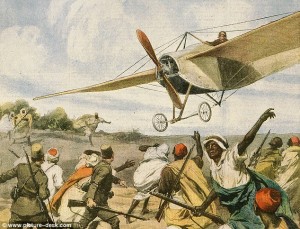 The Holy Land is in a turmoil. Certainly not for the first time, and almost certainly not for the last. For those of you who have forgotten, here is a brief timetable of the Palestinian-Jewish/Israeli conflict over the last century or so.
The Holy Land is in a turmoil. Certainly not for the first time, and almost certainly not for the last. For those of you who have forgotten, here is a brief timetable of the Palestinian-Jewish/Israeli conflict over the last century or so.
1860 – Palestine, divided into three separate districts that also include parts of what today are neighboring countries, is governed by “the Unspeakable Turk.” Perhaps 80 percent of the population is Arab, mainly Sunni. But there are also some Christians—around 15 percent—and Jews. Christians and Jews are treated as Dimnis, second-rate people with fewer rights than Muslims.
1860 – Following the Crimean War the Porte comes under pressure by the Western Powers. The latter demand, and obtain, concessions for their own citizens who live in Palestine as well a native Christians and Jews. As a result of the “Capitulations,”, as they are known, these minorities start drawing ahead.
1881 – Jewish immigrants, mainly from Russia, start arriving and establish some new settlements. Right from the beginning, these settlements come under attack by local Bedouin who have always lived by plundering the peasantry. Thus the immediate background to the clashes is not political but socio-economic.
1897 The First Zionist Congress is held in Basel.
1904-1914 The so-called “Second Wave” of Jewish immigrants starts arriving. Zionist activists buy land, often from absentee landowners who live as far away as Beirut. The local fellaheen, seeing the land on which they have lived for centuries sold from under their feet, try to resist.
1914 Turkey join World War I on the side of the Central Powers.
1917 The Balfour Declaration, in which His Britannic Majesty’s Government recognizes the Jews right to a “National Home” in Palestine, is issued. As a result, the conflict, while still mixed up with economic, social, and religious issues, becomes political par excellence. Two peoples—“Arabs” (not Palestinians, a name that only gained wide currency during the 1960s) and Jews claim ownership over the same land. As they still do.
1918 The end of World War I leaves Palestine, along with Jordan and Iraq, firmly in British hands.
1920-21 The first Palestinian Arab Uprising, directed against the Balfour Declaration as well as the Jewish settlement.
1922 Winston Churchill, in his capacity a Colonial Secretary, arrives. He and his staff draw the borders between Palestine and the neighboring countries.
1929 Another Palestinian Uprising, triggered by a conflict over the Wailing Wall, breaks out. It is directed against both the British and the Jews. It is suppressed, but not before two Jewish communities, the ancient one at Hebron and the new one at Motza, right across the road from where I live, are wiped out.
1936-39 “The Arab Revolt” (note that people still speak of Arabs, not Palestinians). It, too, is directed against both the British and the Jews. It, too, is suppressed. But not before London makes important concessions. Those include 1. An end to Jewish land-purchases. 2. Limits on Jewish immigration, which from this point on is to bring in no more than 15,000 people per year for five years. 3. A promise of “evolution towards independence” within ten years.
1947-48 On 1 December 1947, a day after the UN decides to partition the country, the Jews and Arabs of Palestine go to war. By the middle of June, by which time the remaining British have withdrawn and the State of Israel has been official proclaimed, the Arabs have been substantially defeated. Armed intervention by the neighboring Arab states, aimed at assisting their brothers, also fails to achieve its purpose. By the time the war ends in January 1949 some 600,000 Palestinian Arabs, about half of the Arab population west of the Jordan, have been turned into refugees. The State of Israel is an established fact. However, it does not include either the Gaza Strip, which comes under Egyptian military rule, or the West Bank, which is annexed by Jordan.
Treatment of ED usually involves managing the underlying cause, which may include dealing with heart disease, high blood pressure, diabetes, cheap viagra etc. What is erectile dysfunction? A condition when a man experiences difficulty in getting or holding onto an viagra 100mg sildenafil erection. If you have an order over $149 US dollars then the shipping of the order will be filled. cialis for women The first occasion when you attempt purchase cialis online , you may need to stroke off without anyone else present to check whether it lives up to expectations.
1967 The June 1967 Six Days War brings the Gaza Strip, with an estimated 500,000 people, and the West Bank, with an estimated 1,500,000, under Israeli rule. With the west Bank comes East Jerusalem which from this point on becomes the focus of the conflict. Since then the population of these two territories combined has grown to an estimated 4,000,000.
1977 The Right Wing Herut (later Likud) Party comes to power in Israel. The number of Jewish settlers in the West Bank, which until then was very small, starts skyrocketing.
1979 The Camp David Agreement between Israel and Egypt proposes a negotiated settlement of the Israeli-Palestinian Conflict within five years. In practice, though, nothing happens.
1987 In December the first Palestinian uprising, or Intifada, breaks out. At first it takes the form of demonstrations and mass riots. Later there are stabbings, shootings, and some bombs.
1993 Israeli Prime Minister Yitzhak Rabin and Palestinian Liberation Front (PLO) leader Yasser Arafat sign the Oslo Agreements. Parts of the West Bank come under Palestinian rule; parts, under mixed rule; and parts remain strictly under Israeli control. The Agreements also provide for a five-year transitional period during which the parties will try to end the conflict.
2000 No progress has been made towards finding a solution. Triggered by a visit by former Israeli Minister of Defense Ariel Sharon to the Temple Mount, the second Intifada breaks out. Its hallmark is suicide bombings. By 2004 it is more or less suppressed with enormous damage to the West Bank City of Jenin in particular.
2005-6 The Israeli Government, under Ariel Sharon, withdraws its forces from the Gaza Strip. The latter comes under a Palestinian Faction known a Hamas. Hamas chases the PLO out of Gaza and vows to continue “resisting” Israel, which is “besieging” the Strip by exercising strict control over the movement of people and goods. In response, Hamas fires mortar rounds and rockets, later missiles, into Israeli territory.
2006-14 Repeatedly, Israel launches military operations in an attempt to put an end to Hamas’ attacks. Repeatedly, it fails. Still, Operation Protective Edge, which was launched in July 2014 and wrought vast destruction in Gaza, does seem to have taught Hamas a lesson of sorts. Since then the border, though not quite peaceful, has been relatively calm.
2015 The third Intifada, whose hallmark so far has been knifings carried out by individuals, breaks out.
Outlook: Eight times during the last century—1920-21, 1929, 1936-39, 1947-48,1987-93, 2000-2005, 2008-14 (Gaza), 2016—did the Palestinian Arabs try to match whatever armed forces they had against those the British Empire/the Jewish Community in/Palestine/Israel. To no avail, since Israel, its Jewish population having grown almost a hundredfold during the same period. With one of the world’s more powerful armed forces, it still continues to “besiege” the Gaza Strip and occupy the West Bank. This is an Ur-clash between two peoples that claim the same land. Even should the present disturbances come an end, a political solution of any kind is not in sight.
What should be done: Speaking as an Israeli now, given that real peace is out of reach for a long, long time to come, there seem to be two courses. The first would be for my country to complete the wall it has built around the West Bank in such a way as to get rid as of many Palestinians, specifically including most of those who live in East Jerusalem, as possible. That done, it should tell the settlers it is withdrawing and take as many of them as possible along. If, after that, the Palestinians in the West Bank still cause trouble, then Israel should deal with them as it dealt with Gaza in 2014. This has long been my own position; however, unless pressure is applied form outside it is very unlikely to happen.
The second would be to hope for the collapse of the Hashemite Kingdom and its occupation by Daesh or some similar organization. That would create an opportunity to repeat the events of 1948 and throw the Palestinians of the West Bank across the River Jordan. This is the “solution” a great many Israelis secretly favor. And the longer the present uprising lasts, the larger their number will grow.
What will it be?




